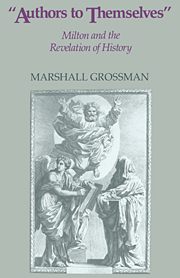5 - “Divine Historian”
Published online by Cambridge University Press: 23 October 2009
Summary
SATAN'S INSPIRATION OF EVE'S DREAM near the end of Book IV begins the temptation and moves the narrative toward the poem's central tragic action: the fall of man. Before this narrative thread is again picked up in Book IX, a long, expository section intervenes. Raphael's visit to Eden, comprising Books V–VIII, relates the events that precede the opening of the epic in medias res. The content of Raphael's discourse sets the scene for what Broadbent has called “the decline into history,” by supplying a (pre)history that situates Adam and Eve as part of a providential design, extending into time as well as space. Although Milton's audience benefits from history and revelation, knowledge of past and future events, Adam and Eve enjoy ample revelation but meager history until Raphael's narration portrays their creation as part of a chain of past events. Adam and Eve mark their need for a personal past by curiously returning in their conversations to the sparse events of their brief tenure in paradise: the prohibition and their respective creations. As a narrative historian, Raphael describes events in the heavenly past by looking forward to the human history that Adam and Eve will soon enter. He thus defines the present moment of their danger as the intersection of an irreversible past and an anticipated future continuous with it; that is to say, he introduces them to the modern historical consciousness implicit in their creation as “authors to themselves.” Raphael's account of the war in heaven and the creation of the world is meant to be interpreted by Adam and applied to his own situation, to provide a historical context for Adam's moral choice in Book IX.
- Type
- Chapter
- Information
- Authors to ThemselvesMilton and the Revelation of History, pp. 91 - 125Publisher: Cambridge University PressPrint publication year: 1988



